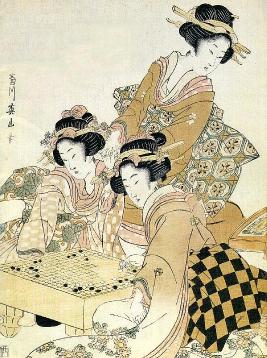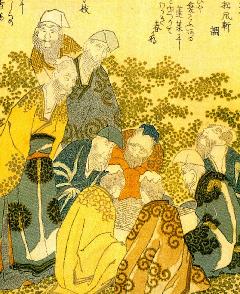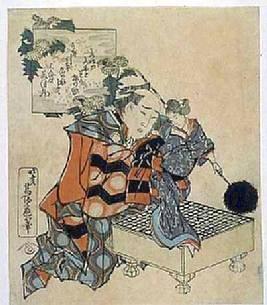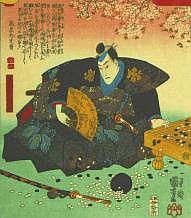Jean-loup's home page
Jean-loup's Go page

 I am a fan of the
game of go (also named WeiChi or WeiQi in China and Baduk in Korea).
If you are interested about go in France,
check also the site of the
French Go Federation.
Or spend some time in the
rec.games.go newsgroup.
You can see some very nice pictures of me playing go
here.
I am a fan of the
game of go (also named WeiChi or WeiQi in China and Baduk in Korea).
If you are interested about go in France,
check also the site of the
French Go Federation.
Or spend some time in the
rec.games.go newsgroup.
You can see some very nice pictures of me playing go
here.
I maintained (up to Sept 8th 2001) the rating list of the French Go Federation. Here is the algorithm description for the ratings computation, including a comparison with other algorithms. French tournament results should be sent to echelle@jeudego.org in one of the standard formats. The latest rating list is here. (More details for French players are on the French version of this page.)
I participated in the creation of a website and cdrom (in French) introduction to the game of go, in particular the sections on go programs and professional games.
I created the Go Teaching Ladder which allows you to give or receive comments on go games. On Unix, you can use cgoban or xgoban to go through the reviews. Read these hints to view the reviews automatically from your browser. This xgoban patch uses a nice wooden board if your system has the xpm libraries. Executables of xgoban are available here for Linux and Solaris.
I maintain the archives of the
computer-go
mailing list in
this directory, files
compgo-mail-*.Z. Please read the archives before posting to the list.
A search engine for these archives is
here.
Instructions for subscribing to the list are given
here.

Internet Go servers
Play go on the Internet with players of all countries using IGS (Internet Go Server) or NNGS (No Name Go Server). I recommend xgospel to connect to IGS from a Unix system. The author of xgospel is Ton Hospel. With his permission I released xgospel version 1.12d which fixes some problems with 1.10d due to changes in the IGS protocol, and adds a number of new features documented in the README file. Before installing xgospel, read the xgospel user's guide, written by Minh Quy Nguyen.The IP address of IGS has changed. Add to your resource file:
*site: 210.146.253.13 or: *site: igs.joyjoy.netor start xgospel with:
xgospel -site igs.joyjoy.net
Binaries of xgospel are available here. For Linux, take the version with libXaw.6!
- xgospel 1.12d for Linux Elf, glibc with static libXaw.6 (for Mandrake >= 7.2, RedHat >= 7.0, SuSe >= 8.0)
- xgospel 1.12d for Linux Elf, glibc
- xgospel 1.12c2 for Linux Elf, libc5
- xgospel 1.12d for Solaris with Xpm support
- xgospel 1.12c for Solaris 5.6
- xgospel 1.12c1 for HP-UX
- xgospel 1.12d for SGI IRIX 6.x
- xgospel 1.12c2 for AIX 4.2 with Xpm support
Other client programs are available
here.

Computer Go
Handtalk was for a long time the world champion among go programs. The commercial version has officially a 3 kyu rank (the level of an average club player), but I am 5 kyu on IGS and I can give Handtalk a 20-stone handicap and win; see my discussion with Martin Müller about this. David Mechner, a very strong amateur go player and a go programmer, makes an excellent analysis of the real level of current go programs. He also published an article about a game between Janice Kim and Handtalk with a 25-stone handicap. A good review of Handtalk written by Matthew Macfadyen, another very strong amateur, is available here.See here my last games with Handltak 9610 at 12, 13, 14, 16, 17 and 20 stones. Here is my first game with Handtalk 9806, at 17 stones with Chinese style handicap. See here a game between Handtalk and two German dan players at 19 stones, one game between Handtalk and an IGS 2d player at 20 stones, and one game with a 1d player (IGS 3k) at 25 stones. Handtalk lost all these games. (Read the hints first to view these games from your browser.) Handltak is sold by Yutopian, and by Het Paard in Europe. A free 9x9 version is distributed by Yutopian.
Go++ is now the strongest of all programs. It won the 1999 ING cup by beating all its opponents, including Handtalk. Here is a game I won against Go4++ (the 1998 version of Go++) at 17 stones with Chinese style handicap; Go4++ plays rather well except for a few costly mistakes. To see how much Go++ has improved since, here is a game at 9 stones, which I lost by 3.5 points in May 2003.
Many Faces of Go is not as strong as Handtalk or Go++, but it is a good program for learning go thanks to its nice user interface and go tutorial. A free 9x9 version is available as Igowin. Igowin considered me as 4 dan (very strong amateur) after losing at 3 stones, which is unfortunately highly inflated. Here is a game won by Martin Mueller (5d) against Many Faces at 29 stones.
TurboGo is a shareware
program for Windows95, much weaker than Handtalk and Go++. (TurboGo does not
recognize that groups with a single eye are dead.) The DOS version is freeware
but even weaker. My only game with TurboGo 4.0 (at 9 stones since the
program does not handle larger handicaps) is
here.

Converters between Go formats
I wrote a minimal converter from Handtalk format to SGF format. You can find here the sources and an MSDOS executable. To use it: ht2sgf file.ght file.sgf.
The following patch to
sgf2misc creates a converter from SGF format to the GO format
(a variant of the Ishi format). Here are executables for
MSDOS and Linux. To use
them:
sgf2go < file.sgf > file.go
For Linux, the resulting .go file must be converted to MSDOS CR/LF
format. This can be done with flip -m. The shell script
sgf2gos automates this.
The Kisei final
The 1st game of the 23rd Kisei final was played in Paris (France): Cho Chikun (black) vs Kobayashi Koichi (white). Cho won by resignation at move 203. Here is the game record in sgf format including comments by Kataoka 9p, Takemiya 9p and Otake 9p. Jan van der Steen made another record with excellent comments and many variations. You can also get the game record in postscript (184K), compressed postscript (43K) or Word (95K) formats, thanks to Jonathan Cano and Jean Hossenlopp, but these versions have some errors in the order of moves at the end. Read these hints to view the game in sgf format automatically from your browser.I replayed this game live on IGS on Jan 13rd and 14th, 1999. Thanks to the Yomiuri Shimbun for allowing live retransmission of this game. Read there an interesting report about the Cho-Kobayashi rivalry in the Kisei. The results of the other games are here.
 Thanks to
Zjev Ambagts,
the
Fine Art Museums of San Francisco and
Ken Warkentyne
for the images of go players.
Thanks to
Zjev Ambagts,
the
Fine Art Museums of San Francisco and
Ken Warkentyne
for the images of go players.